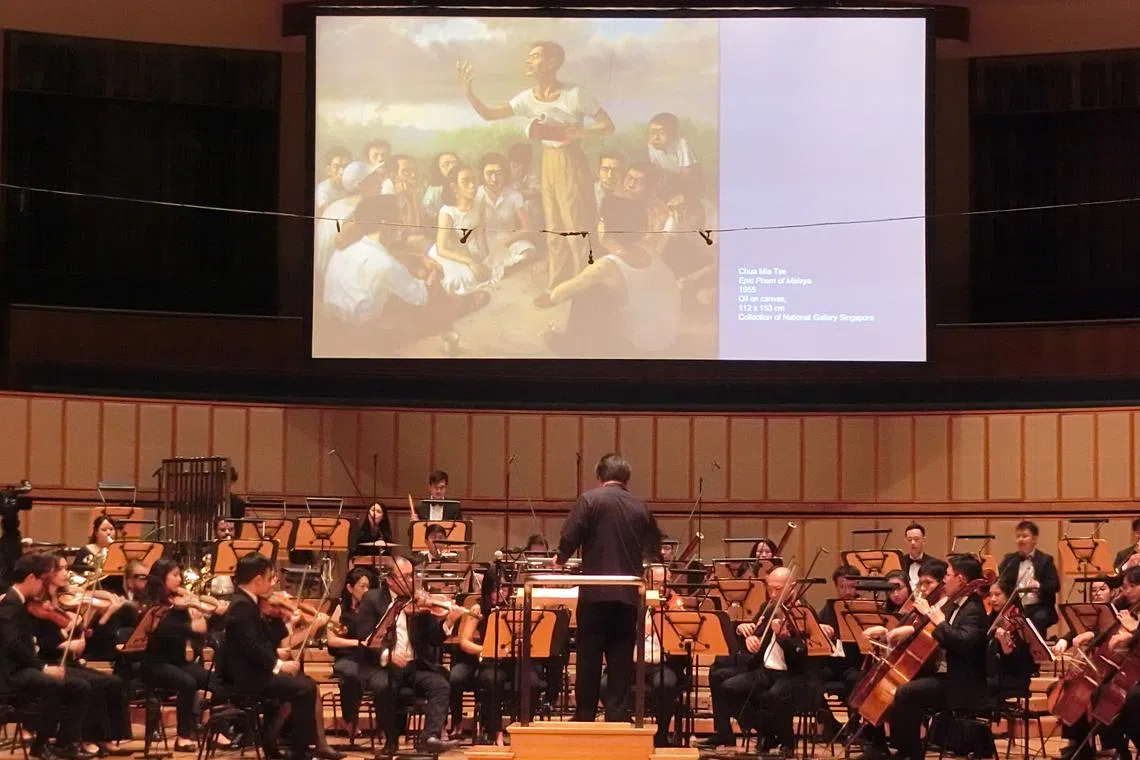Concert review: Music Commissioning Series boosts Singapore classical music scene with Kelly Tang’s new work
Sign up now: Get ST's newsletters delivered to your inbox

Cultural Medallion recipient Kelly Tang's latest symphony is inspired by the artworks of fellow Singaporeans.
PHOTO: CHANG TOU LIANG
Follow topic:
Movements In Time – Artworks From The National Gallery Metropolitan Festival Orchestra
Esplanade Concert Hall
Saturday, 7.30pm
Singaporean composers do not often get commissions to write substantial works of music. Other than the Singapore Chinese Orchestra, which has an ongoing composer-in-residence programme, no major musical organisations here commissions major new works with any regularity. Token gestures just will not do.
This is set to change with the new Music Commissioning Series initiated by the Foundation for The Arts and Social Enterprise founded by Michael Tay, Singapore’s former ambassador to the Russian Federation. The foundation’s first commission was Movements In Time – Artworks From The National Gallery by Cultural Medallion recipient Kelly Tang.
Delayed by the pandemic and hindered by the composer’s debilitating stroke, the work finally received its world premiere by the Metropolitan Festival Orchestra conducted by Chan Tze Law.
Conceived as an orchestral suite of seven movements, the 35-minute work was inspired by artworks including paintings, prints and a sculpture by five Singaporean visual artists. Similarities to Mussorgsky’s Pictures At An Exhibition were minimal, as Tang’s pieces were more substantial, some of which may be performed as separate works on their own.
With the brief opening Fanfare, dominated by brass, Tang crafted something akin to a film theme, quasi-heroic while nailing his colours to the mast. His idiom was highly accessible, slickly crafted but without leaving his comfort zone.
The first artwork, The Idealist, was based on Chua Mia Tee’s famous Epic Poem Of Malaya (1955), depicting a standing speaker and his rabble-rousing oration. There was a Socialist-Realist feel, predictably patriotic in character about it.
Quite different was Mystery, inspired by Simryn Gill’s Standing Still #28 (2000-2003), a chromatogenic print depicting dereliction and urban decay. Its cautiously traipsing steps suggested something sinister afoot, possessing a similar unease as Mahler’s single-movement Piano Quartet.
Following a short Interlude was Contemplation, an oasis for strings which reflected upon Eng Tow’s Bowls (1979). This eminently repeatable movement also included a slightly agitated central fugal section before closing with solo trumpet and solace in G major.
The most dissonant movement was Enigma, after Han Sai Por’s Extinction Series 12 (2009), with its tension ratcheted to a martial high before a haunting balm with solo flute and harp to conclude.
The final Dance, inspired by Voices Of The Soul (undated) in batik by Tzee (Sarkasi Said), celebrated with ethnic clapping rhythms which provided for a suitably festive ending. The ensuing ovation also saw its last pages encored by the orchestra.
Over the next 10 years, it is hoped that the series sees that rarest of Singapore’s musical entities – the symphony – be further explored. Tan Chan Boon’s six symphonies await to be premiered, while the late Leong Yoon Pin’s two symphonies are ripe for re-assessments. The splendid Metropolitan Festival Orchestra under conductor Chan are just the people to do it.
The concert opened with the first recipient of the foundation’s Prodigy Fund, 11-year-old Mikkel Myer Lee, performing a short Chopin programme, including the Third Ballade and a selection of Preludes (Op. 28). He was excellent.
This was followed by a documentary film about the recording of Russian composer Vladimir Martynov’s Utopia Symphony (formerly titled Singapore: A Geopolitical Utopia), commissioned by Tay in 2004, by the London Philharmonic Orchestra at London’s Abbey Road Studios in 2019. The classical music scene in Singapore has received the biggest boost in years, and long may this continue.

